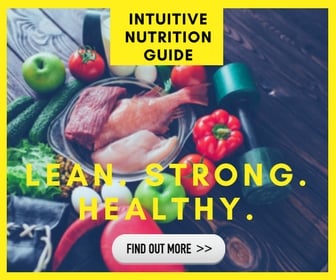Are you looking to shed a few pounds before summer? We can definitely help with that. Try incorporating the following simple habits into your daily routine.....
Up the N.E.A.T.

Start by focusing on Non-Exercise Activity Thermogenesis, or N.E.A.T.. N.E.A.T. is anything you do outside of focused exercise that still burn calories. Things like: walking around the grocery store, doing the laundry, etc.
Consciously make decisions that will force you to move a bit more than normal. Choose the parking spot furthest away from the store. Go on a morning walk. Take a lap around the office. All these seemingly small decisions add up quickly, and make a huge difference over the span of a few months. N.E.A.T. doesn’t have to be miserable (like cardio is for most), and can easily be combined with other things that add value to you life; such as listening to an audiobook, or walking with a loved one.
Destress

Are you constantly feeling stressed out? This is counterproductive to your weight loss.
High stress leads to increased levels of “The Stress Hormone” cortisol. Too much cortisol can have a wide array of negative effects on your body.
When cortisol is released, ghrelin “the hunger hormone” is released with it. Ghrelin is responsible for stimulating your appetite. This is where “stress eating” comes from. Ghrelin also has been shown to “reduce energy expenditure, stimulate hunger and food intake, and promote retention of fat.” (1)
Elevated stress and cortisol levels leave your body in a constant “fight-or-flight” state. In this state you body perceives an imminent attack, due to all the stress. To prepare, the body shuts down or significantly slows all but the most essential functions to survival. In this process, many important functions, such as hormone production and food digestion are pushed aside.
Stress also leads to poor sleep. Think of inadequate sleep as another form of “stress” on the body. When you’re lacking sleep, more cortisol is released.
So when you sleep less, your stress hormone and hunger hormone levels are much higher. Not a great combination for fat loss. (For an EYE OPENING study on the huge effect sleep has on fat loss, click HERE: https://news.uchicago.edu/article/2010/10/03/sleep-loss-limits-fat-loss-study-finds )
How can I destress?
Incorporate a meditation practice: Adding meditation into your daily routine is incredible for reducing stress. Meditating has been proven by studies to reduce perceived stress and anxiety. (2) Meditating has HUGE benefits in return for just a few minutes of your day.
Tons of smartphone apps such as “Headspace” ( https://www.headspace.com/ ) and “brain.fm” ( https://www1.brain.fm/ ) are perfect for guiding beginners through the process. For more advanced instruction, check out: https://www.aubreymarcus.com/pages/meditation-course
Focus on your breathing: Most of out breathing consists of short, choppy breaths into the chest. Compare this to a deep relaxed sigh, that seems to originate from the belly.
Diaphragmatic breathing or “belly breathing” is basically just focusing on filling your belly with air instead of your chest. Because this is how we naturally breath in an extremely relaxed state, focusing on diaphragmatic breathing can effectively shut off the “fight or flight” response. This makes it incredible for reducing stress, and calming the mind in stressful situations.
The focus required on the breath can give diaphragmatic breathing a similar effect to meditation, pulling the mind into the present.
Prioritize Protein

Protein is a very satiating macronutrient (it makes you feel full). This satiating effect is extremely helpful when trying to limit calories.
Protein is also muscle sparing (allows you to hold onto more muscle). The more muscle you can maintain throughout the fat loss process, the easier it will be to get lean AND the better you’ll look when you hit your weight loss goals.
The thermic effect of food is the amount of energy (calories) used to digest and process the food you consume. Protein has the highest THERMIC EFFECT of all the macronutrients, meaning it requires your body to expend more energy to process than other macros.
Weight loss all boils down to a calorie deficit. Think of it like this:
Energy IN < Energy OUT = Weight loss
We take in energy by eating. We expend energy through movement and bodily processes. The thermic effect of protein alone isn’t going to make a huge difference in weight loss, but with all the combined benefits of protein, it’s worth focusing on.
As a general guideline: .7-1 grams of protein per lb of bodyweight daily will yield all the benefits of protein without overdoing it, for most active individuals.
Consistently incorporate these into your routine, and you’re well on your way to a leaner, less stressed you.
Sources:
(1) https://news.uchicago.edu/article/2010/10/03/sleep-loss-limits-fat-loss-study-finds
(2) https://www.ncbi.nlm.nih.gov/pubmed/26426148






